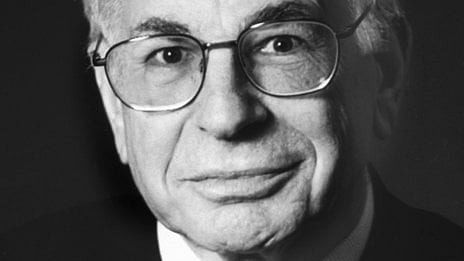
Daniel Kahneman
Daniel Kahneman who to many regard as the world’s most influential Psychologist and Nobel laureate, passed away a few days ago at the age of 90. His death leaves a void in the field of behavioural economics. Although he did not study economics, he was awarded the Nobel Prize in Economic Sciences in 2002 for his pioneering work in behavioural economics, which he shared with Vernon Smith.
His research and works highlighted the human element often overlooked in traditional economic theory, challenging the classical economic assumption that humans are rational decision-makers.
Kahneman was born in Tel Aviv in 1934 to Lithuanian Jewish parents who had migrated to France in the early 1920s. His childhood was shaped by the events of World war II and spent in Paris under Nazi occupation. His family was on the run until the war ended.
In his biographical account published when he received the Nobel Prize, Kahneman wrote: “Like many other Jews, I suppose, I grew up in a world that consisted exclusively of people and words, and most of the words were about people. Nature barely existed, and I never learned to identify flowers or to appreciate animals. But the people my mother liked to talk about with her friends and with my father were fascinating in their complexity. Some people were better than others, but the best were far from perfect and no one was simply bad.”
Kahneman’s early years explain why he was more interested in psychology.
He returned to Palestine in 1948, just before Israel was created, completed his Bachelor of Science in psychology from the Hebrew University of Jerusalem, and briefly served in the Israeli army before migrating to the United States where he did his PhD in psychology from the University of California.
In 1982, Kahneman collaborated with fellow Israeli Amos Tversky to published the seminal article, Judgement under Uncertainty: Heuristics & biases, which introduced the prospect theory. Together, they challenged the assumption of classical economics that people are rational decision-makers capable of evaluating choices while buying goods like mobile phones or cars. Their research revealed that humans are prone to biases and mental shortcuts that often lead to irrational decisions.
Kahneman and Tversky identified over two dozen biases, including the popular anchoring bias and loss aversion. Anchoring bias is the tendency to rely on the first piece of information, serving as an anchor around which subsequent decisions are made. This explains why restaurants put overpriced items on top of the menu. A Rs 200 burger seems less expensive compared to a Rs 1,000 large pizza on top of the list.
Loss aversion explains why investors are more afraid of losses than excited about gains, leading them to hold on to underperforming stocks.
Kahneman’s influence extended beyond economics, shedding light on human judgement and decision-making across various fields, from insurance to baseball games. His 2011 book Thinking Fast & Slow summarises his findings on cognitive biases, prospect theory, and happiness.
In his later years, he ventured into hedonic psychology, exploring the science of happiness and what contributes to a fulfilling life reflecting his lifelong fascination with human experience beyond just decision-making.
In an interview with Observer in 2021, when asked about the variation in sentencing for the same crimes by judges influenced by external events such as weather or sports, Daniel Kahneman expressed his belief that “Artificial intelligence is clearly going to win and how people are going to adjust is a fascinating problem.” He worked at Princeton University from 1993 until his passing.
(The writer is a CFA and a former banker. He currently teaches at Manipal
Academy of Higher Education, Bengaluru)